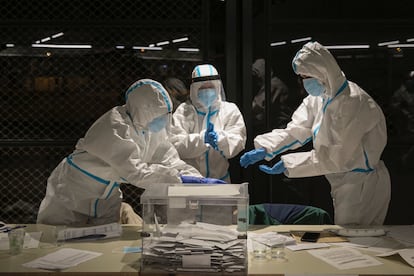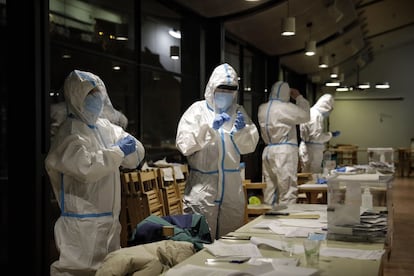‘Zombie hour’ at the Catalan elections: when coronavirus cases came out to vote
People who had tested positive for the virus or who were in quarantine were advised to cast their ballot between 7pm and 8pm, but in the end few decided to make the trip


Sunday’s regional election in Catalonia was always going to be strange because of the coronavirus pandemic, but the strangest part of all came at the end of the day. People who tested positive for the virus or who were in quarantine were advised to vote between 7pm and 8pm, the last hour before polling stations closed. With a touch of dark humor, this period was soon dubbed the “zombie hour.”
When the polls opened on Sunday morning, workers at the voting stations were already anxious about what this final hour would involve. Indeed even before election day, a quarter of the 82,251 citizens who were randomly selected to man the stations requested to be excused from their duty, reflecting widespread fear about contracting the virus.

But as the day progressed, the lines and bustle of the morning gave way to calm as the zombie hour approached. At the voting station in Barcelona’s famous Sant Antoni market, which was designated for 17,000 voters, there was nobody and silence echoed between the closed doors. Those manning the station killed time talking about their lives and getting to know one another. After all, they were strangers randomly thrown together like passengers on a long train journey. As the afternoon wore on, one of the workers voiced their suspicion: “You wait and see, nobody is going to come.” Most thought that was common sense, the reasoning being a person is not going to vote in the zombie hour if they don’t have the virus, and less so if they do. “Look,” explained one worker. “At this station, 48 of the 700 people on the register have voted by mail. It’s a huge amount.” Indeed, according to the postal service, applications for mail-in ballots tripled since the previous election in 2017.
At 6.40pm, 20 minutes before zombie hour, the workers who remained at the station resignedly began to open bags of personal protective equipment (PPE) – a white hazmat suit, protective face shield and gloves. All of a sudden, the corridors of the market turned into changing rooms. “Here there’s an extra-large!” one called out. “Do we have to wear the hood?” another asked. It was inevitable that they would want to take at least one photo in the outfit. Some cracked jokes. “This is surreal,” they said, looking at themselves in a mirror, dressed like the NASA officials in the sci-fi film E.T. the Extra-Terrestrial. Everyone sent a photo to their WhatsApp groups. The workers had been fearing the arrival of zombie hour all day, but in the end, the polling station was practically deserted. No one wanted to cast their vote at this time, just like almost none of the workers wanted to be there. “I’m not afraid, but no one likes this,” said one polling official, while zipping themselves into a hazmat suit.
Between 7pm and 8pm, only seven people entered the voting station in Sant Antoni market. One of them, a young lady, was voting for the first time. Her family was waiting outside and applauded her when she came out. An elderly man also entered, yelling: “A little bit of humor, this is pulling down our spirits!” When the station finally closed, it was as if it had shut an hour earlier. Staying open made almost no difference in terms of votes. But it made a difference to the workers manning the station. When it was announced that the day was over, they took off their suits with a sigh of relief. By that time, the workers had been at the station for 12 hours. In the end, they were the zombies. And they still had to count the votes, a process that was going to take longer in order to reduce the risk of contagion. Just par for the course for what has been a long and strange year.
English version by Melissa Kitson.
Tu suscripción se está usando en otro dispositivo
¿Quieres añadir otro usuario a tu suscripción?
Si continúas leyendo en este dispositivo, no se podrá leer en el otro.
FlechaTu suscripción se está usando en otro dispositivo y solo puedes acceder a EL PAÍS desde un dispositivo a la vez.
Si quieres compartir tu cuenta, cambia tu suscripción a la modalidad Premium, así podrás añadir otro usuario. Cada uno accederá con su propia cuenta de email, lo que os permitirá personalizar vuestra experiencia en EL PAÍS.
¿Tienes una suscripción de empresa? Accede aquí para contratar más cuentas.
En el caso de no saber quién está usando tu cuenta, te recomendamos cambiar tu contraseña aquí.
Si decides continuar compartiendo tu cuenta, este mensaje se mostrará en tu dispositivo y en el de la otra persona que está usando tu cuenta de forma indefinida, afectando a tu experiencia de lectura. Puedes consultar aquí los términos y condiciones de la suscripción digital.








































